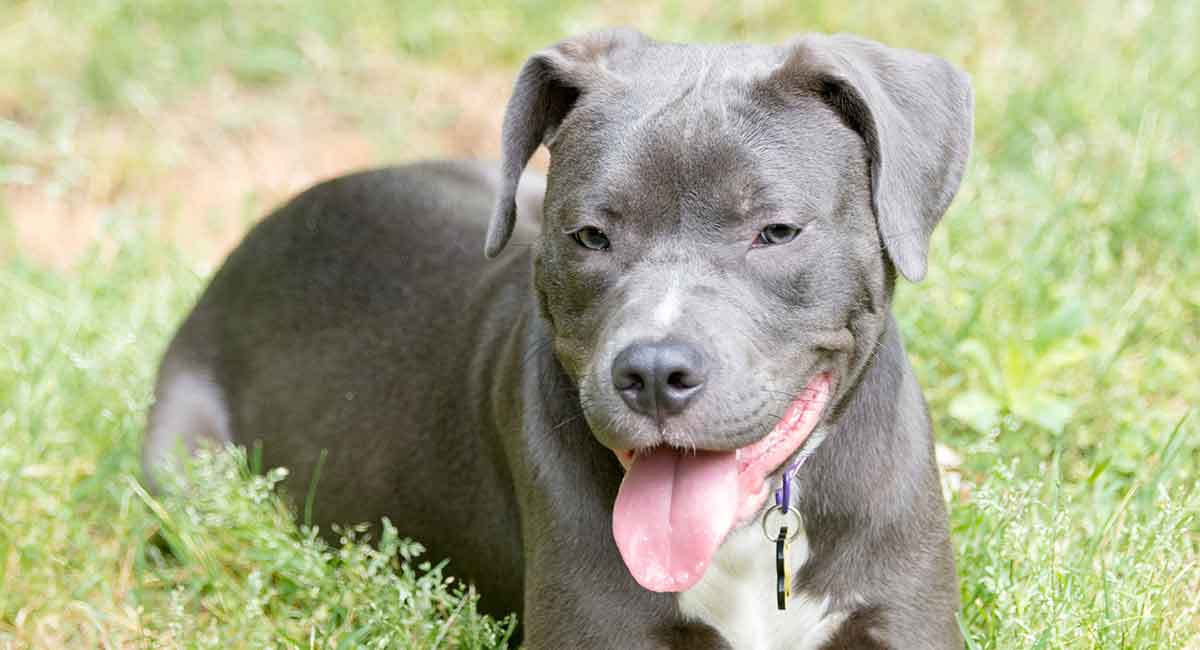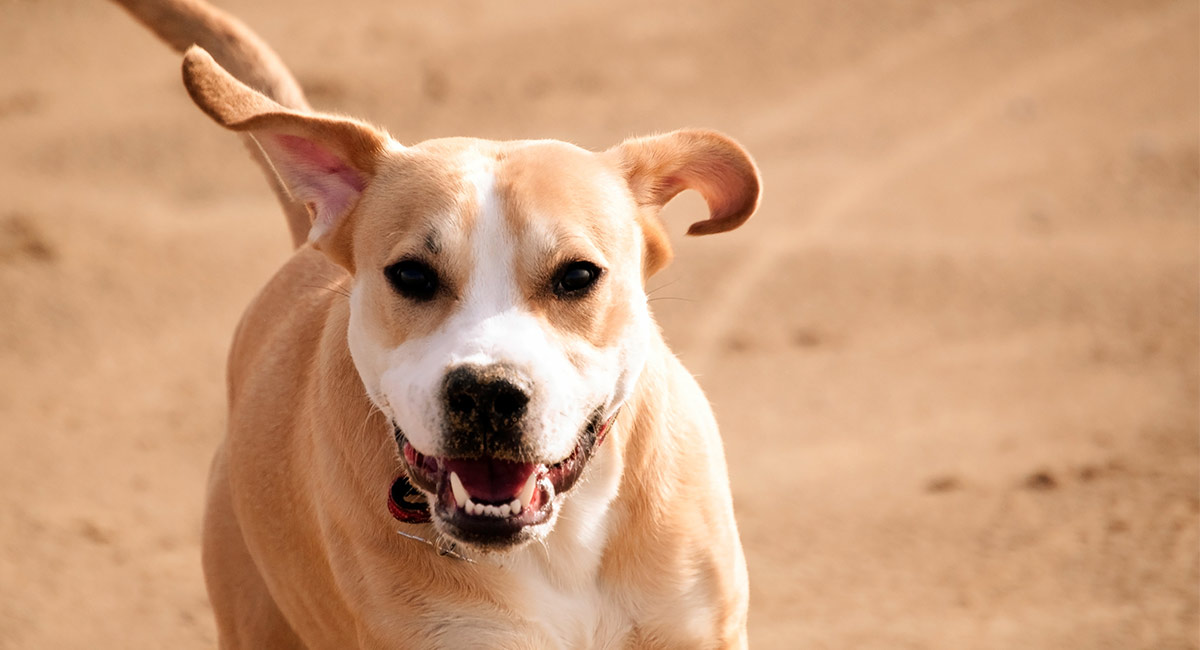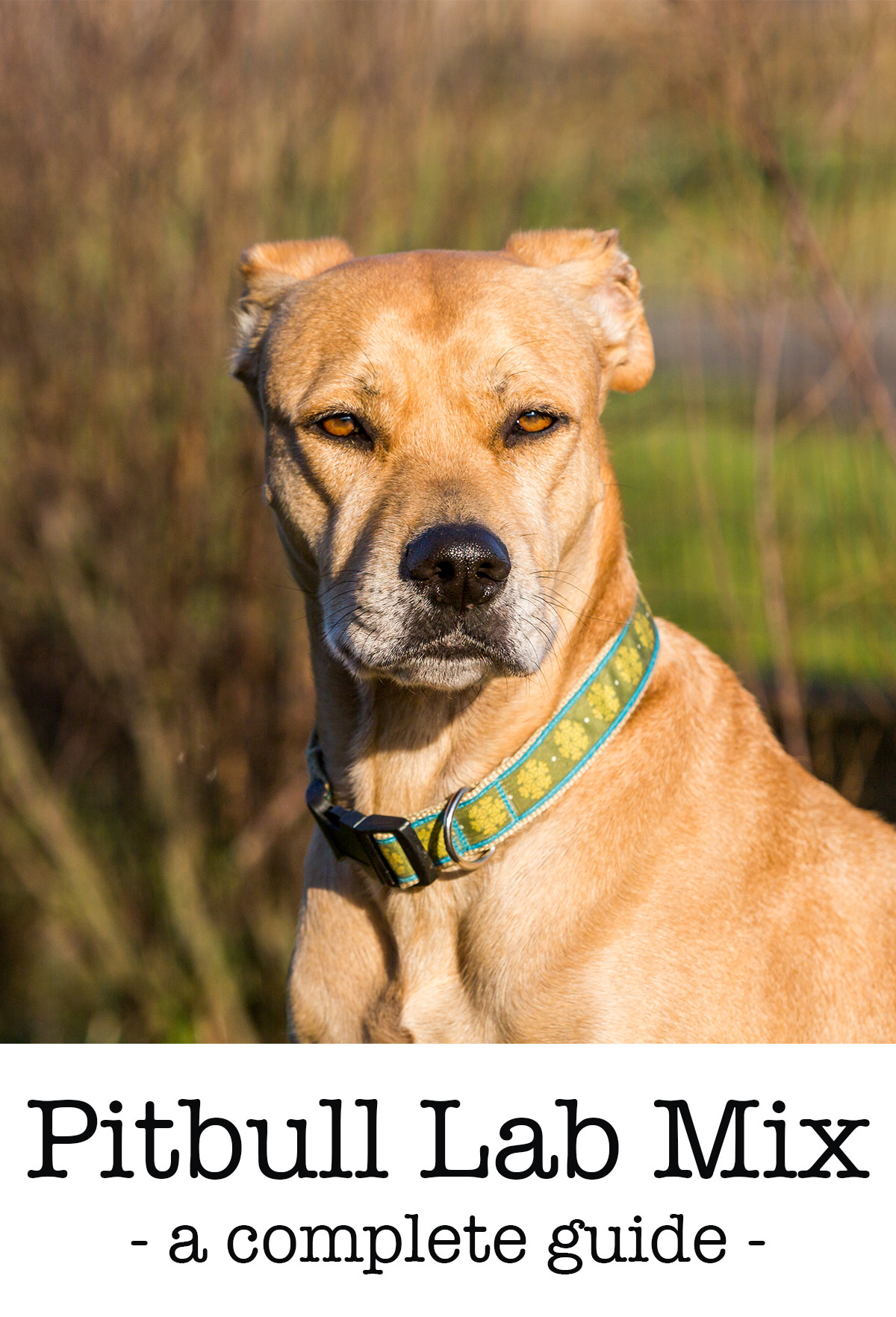[ad_1]

Pitbull Lab mix dogs are an energetic, loyal and active hybrid designer dog, with one American Pitbull Terrier parent and one Labrador parent. Known as the Bullador, Labrabull or Pitador, their ancestors were cooperative hunting partners, service animals, hard working guardians and even fighting dogs. Pitbull Lab mixes are smart, alert dogs that make great companions and faithful, protective watchdogs. These high shedding, short coated medium sized pups weighing around 70lbs when full grown. Pitbull Lab mix puppies are unlikely to be aggressive when well socialized, positively trained and exercised.
Contents
Protective yet friendly, the Pitbull Lab mix has a range of reputations to live up to. We’ll dig into the myths around Pitbull mix aggression, and look at whether this traditional nanny dog really is good with kids or strangers.
A Varied History
The American Pitbull can trace its ancestry back to Britain. Their breeders combined Old English Terriers with Old English Bulldogs. These breeds were used in bloodsports until the practice was banned. Sadly, the stigma attached to being used as fighting dogs has stuck with Pitbull-type breeds through the years.
Labrador Retrievers were originally bred as hunting dogs. Consistently ranked as America’s most popular dog breed, they are popular family pets. They are also commonly used as therapy dogs, in search and rescue missions and as seeing eye dogs for the blind. When you make a Pitbull and Lab mix, any of the qualities of the parent breeds can be passed on, in any combination.
Growing controversy over American Pitbulls in recent years has led to a lot of misinformation about the breed. Pitbulls are banned in several countries because of their reputation as a fighting dog. A big concern is that when Pitbulls bite, they don’t let go. And it’s a reasonable worry. However, if properly bred, socialized and trained, these are wonderful dogs with a warm, loving and affectionate temperament.

What Do They Look Like?
When buying a cross-breed there are no guarantees. Puppies can resemble either parent, or a combination of both. There can even be big differences within the same litter. But, Labrador and Pitbull breeds do have some similarities that are likely to appear in your Pitador puppy.
Pitbull Lab Mix Size
Both have medium-sized, athletic frames. Pitbulls are quite muscular, with wide chests and broad, flat heads. But, Labs are taller, with a slimmer shape and a longer nose. So, Labrabulls will range from 50 to 90 pounds.
Labrabull Coats and Colors
They have a short and silky coat and come in a variety of colors.
Coat colors include brindle, brown, black and white and tan. You may also find a black Lab and Pitbull mix or a chocolate Lab Pitbull mix. Another popular variety is the yellow Lab Pitbull mix.
A dog’s coat can change with age. For example, your glossy black Lab Pitbull mix puppy will likely get some gray around his muzzle and eyes as he gets older.
Grooming and Shedding
Thanks to its parents short-haired genes, the Labrador Pitbull mix is fairly low-maintenance when it comes to grooming.
His smooth, dense coat doesn’t require much attention so you can relax. Just bathe when necessary and brush as needed. But, during shedding season you might find you are grooming a lot.
Labradors are very high shedding dogs, and as such your puppy could be too. Make sure to get him used to being groomed regularly. This will make your job easier when he starts to molt!

Pitbull Lab Mix Temperament
Both Labradors and Pitbulls are clever and loyal dogs. So you can expect your Pitbull Lab mix to be the same. Many Pitbull advocates praise their intelligence, willingness to learn and love for their families.
Labrador Retrievers are known as excellent family pets. They are friendly and outgoing and play well with other dogs. So, a Pitbull and Lab mix is likely to be a people-pleaser when it comes to his family. This super-smart mutt will do anything for praise and attention.
But, they will need company for much of the day, due to their strong bonds. They are therefore not an ideal pet for anyone who works away from home. Or who cannot bring their dog along with them during the day.
Intelligent dogs can become bored and destructive if left to their own devices too often. This can also result in barking.

Are They Aggressive?
A genuine concern about Pitbulls is their bite reflex. Compared with bites from other dogs, the damage that they can do is much more severe. In a study of over 200 bites over a period of 15 years at one trauma center, 30 injuries were by Pitbulls. The level of injury caused by them was far greater.
If you are bitten by a Pitbull you are more likely to have a worse injury, and more likely to die from it. It’s a chilling fact, but we can put another spin on it.
Biting Risks
The American Temperament Test Society runs a temperament test to evaluate breed behavior. According to its 2016 results, the American Pitbull passed the test with a 87.4 percent pass rate. So, this makes it more even-tempered than Cocker Spaniels and Beagles!
Many anti-Pitbull advocates point to the Center for Disease Control’s claim that Pitbulls are within the top three biting breeds, behind Chihuahuas and Bulldogs. However, the CDC itself admits that these numbers are culled from media headlines that could potentially misidentify the breed.
A more recent study by Dr. James Serpell at the University of Pennsylvania ran different breeds through a series of tests and found that the top three most aggressive were Dachshunds, Chihuahuas, and Jack Russell Terriers.
Cautions For Pitbull Owners
Pitbulls might not be the most likely dog to bite you. But if they do, it is much more likely to lead to severe injury or death. This doesn’t necessarily mean you shouldn’t own a Pitbull. But you need to throw yourself into socialization and definitely meet the Pitbull parent to assess their temperament.
Although genetics play a role in aggression, a dog’s upbringing can have an impact, too. Being a responsible owner means giving your dog the tools to curb his anxiety. This involves training, socialization, and lots of praise and support.
Pitbull Lab Mix Training
Training your Lab Pit mix is a very rewarding experience for both dogs and owners. Given its extremely intelligent parentage, this hybrid responds very well to instructions and can master the basics in no time. Both Pitbull and Lab breeds work best with positive reinforcement. They love to please their owners and are extremely willing.
Using punishment to train your puppy is not advised. This can destroy the trust between dog and owner. In addition, it can lead to problems in the future with aggression. Punishing a dog causes them to hide the warning signals that they are unhappy.
This makes biting more likely in future, because they don’t know how to tell you they are uncomfortable in a situation. Use reward-based methods and train together every day to build an even stronger bond between you.
Your Labrabull will definitely need regular exercise. As it will be on the larger side and quite active. An hour’s worth of exercise per day is recommended, as well as play time in a fenced-in yard.
Importance Of Socialization
While Pitbulls have a bad reputation that is not entirely fair, there is some truth to it.
The risks of biting is higher than with some breeds, the severity of bites is far worse. Plus, Pitties can be territorial and display some guarding characteristics. So, when you buy a puppy with a Pit parent, you need to commit to socialization as a number one priority.
A confident dog is a safer, happier dog. And dogs become confident through early exposure to the situations which have potential to worry them as adults. It is very important to socialize a Pitbull Lab mix puppy as early and often as possible.
Health And Care
Both Labradors and Pitbulls are generally healthy dogs. But there are some serious genetic health conditions that your puppy could inherit. So health screening of both parents is essential.
The breeder should provide you with evidence of good hip and elbow scores for both the Labrador and Pitbull parent. They should also show you an eye test for each of them, carried out less than a year ago. And a clear DNA test for PRA blindness.
The Labrador parent should have no family history of exercise-induced collapse or cruciate ligament problems. The Pitbull parent should have no history of skin problems. Do not go to a breeder who is unwilling to provide evidence of the parent dogs’ health.
How Long Do Pitbull Lab Mix Dogs Live?
Labradors live on average 12.5 years. Pitbull lifespan is around the same. This is, therefore, a fair guess for your puppy’s life expectancy. This is about the average lifespan for medium-sized to large breeds.

You need to feed your Bullador a well-balanced diet to ensure he gets all the nutrients he needs. Especially because these dogs require so much exercise! On top of this, make sure you regularly check your Labrador Pitbull mix’s teeth and ears.
Are Pitbull Lab Mix Dogs Good With Kids?
Although Pitbull dogs are often great with the kids in their families, the nature of their bite and severity of the injuries they cause is something you need to seriously consider before you bring one into a home with children.
Never leave a Pit mix alone and unsupervised with kids, and make sure that they treat him with respect. Well-bred, well-socialized Labrador and Pitbull mixes are a breed that give as much as they get. Putting lots of love, time and attention into your dog when it’s a puppy will reap rich rewards in the future.
Shelter Dogs
Adopting dogs is always a risk, as you won’t know their parentage or health history. But giving a rescue Pitbull Lab mix can be very rewarding. For both pup and owner. Check with your local shelters to see if they have any mixed breeds.
Pitbull Lab Mix Puppies
Being a hybrid, Labrador Pitbull mix puppies can vary. Some may inherit more Lab genes, others will favor Pitbulls. The only way to know what you are getting is to meet your puppy first, and talk to the breeder.
Most breeders charge around $400 for a Labrabull puppy. But, there may be additional costs for health check-ups and official documentation.
From day one make sure you have visitors to the house at least four times a week. Make sure there is a range of adults and children, and that each new person gives the puppy praise and treats upon arrival.
Take your pup to every type of location you think you might visit together. And make sure lots of people say hello to her. Again, if possible, they can give her treats to reward her and help build a positive association.
Supervised interaction with other dogs will teach your dog how to play properly, and respect his furry friends. Organised play dates or behaviorial classes can help your puppy learn to be a calm and happy part of a pack.
[ad_2]
Source by [author_name]



